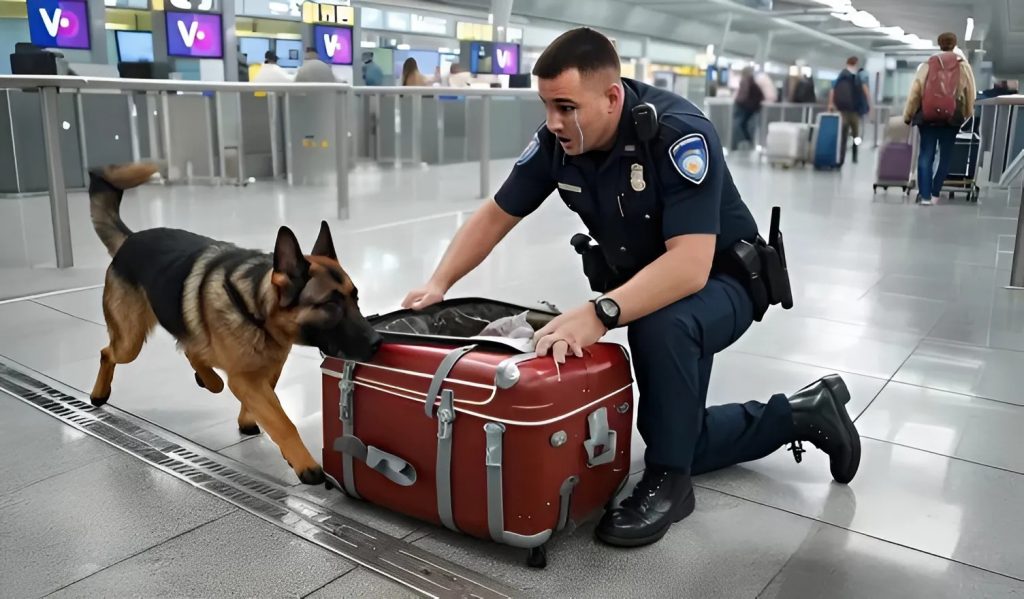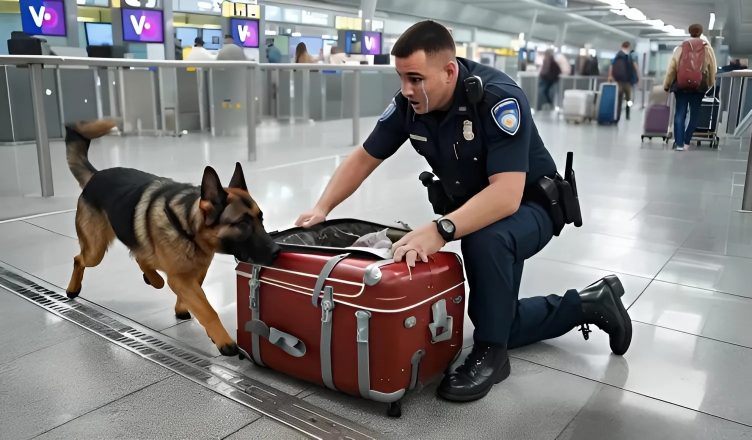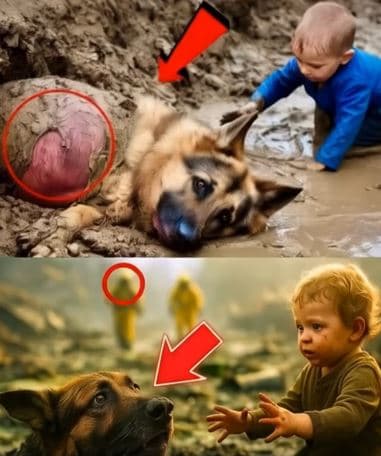In the quiet morning hum of a small town train station, life moved predictably. Commuters shuffled to platforms, coffee in hand, unaware that something extraordinary was about to unfold. It began with a dog—a shaggy, medium-sized shepherd mix with alert ears, a keen nose, and the kind of eyes that seem to see right into your soul. His handler, Officer Laura Mendes, was finishing her second sweep of the station. The dog, named Rex, was trained to detect explosives and narcotics. But that morning, Rex detected something else. Something that would change the course of several lives.
Rex suddenly stopped in front of an unmarked suitcase sitting beside a bench near the corner of the waiting area. It wasn’t unusual to find lost or unattended luggage, but the dog’s behavior was. His stance shifted from alert to urgent. He barked once, then again, then scratched at the suitcase.
Officer Mendes narrowed her eyes and approached cautiously. Standard procedure dictated she call in a bomb squad, clear the area, and investigate with robotic equipment. But something in Rex’s intensity made her hesitate. He wasn’t responding with his trained cues for explosives. There was something else going on.
By the time backup arrived, the area had been cordoned off. The station’s ambient buzz turned into hushed murmurs as passengers were redirected. Two more officers joined Mendes, who knelt by Rex, now whining lowly, nudging the suitcase gently with his snout.
The commanding officer gave the nod. Slowly, carefully, they opened the suitcase.
Inside, nestled among a few threadbare clothes and old shoes, was a baby—barely a few weeks old, wrapped in a thin, tattered blanket. The child wasn’t crying. In fact, she barely moved. Her skin was pale, her breath shallow. The officers froze for a moment, stunned by the weight of what they were seeing.
Then everything moved fast.

Officer Mendes scooped the infant into her arms while her colleague radioed for emergency services. Paramedics arrived within minutes and rushed the baby to the hospital. Rex whined at the departing ambulance, pacing anxiously, tail twitching.
News of the discovery spread like wildfire. Within hours, local media was reporting the story. Social media lit up with questions, theories, and concern. Who would abandon a baby like that? And why? But amid the horror, people clung to one comforting detail: the dog who saved her.
At the hospital, doctors confirmed the baby was suffering from exposure and malnutrition but would recover with proper care. She had no identification, no notes, and no visible birthmarks. Authorities began the painstaking process of searching for her origins.
Meanwhile, Rex became an instant hero. His photo, taken just moments after the rescue, standing tall beside the suitcase with those expressive eyes, was shared thousands of times. Headlines dubbed him “The Guardian of the Station.” Animal lovers, parents, and even cynics admitted they felt something stir reading about him.
But the story didn’t end there.
Ten days after the incident, a young woman came forward. Pale, exhausted, and trembling, she told her story to the police through broken sobs. Her name was Lila, and the baby was her daughter. She had run away from an abusive household, ending up homeless and penniless. Desperate and ashamed, she believed leaving her child in a public place would give her a better chance of survival.
She stayed nearby for hours after abandoning the suitcase, watching and praying someone would find her daughter before it was too late. Lila had seen the news. Seen Rex. And finally, the guilt broke through her fear.
It wasn’t long before a more complete picture emerged. Lila had tried to seek help but had fallen through bureaucratic cracks. She wasn’t an addict or a criminal. Just a scared young woman without support. After careful evaluation, social services stepped in—not with punishment, but with assistance. Counseling, shelter, and, eventually, reunification with her child.
Rex was honored in a ceremony at the city hall. Though dogs can’t understand the human meaning of medals and speeches, he sat proudly as Officer Mendes stood beside him, tears in her eyes. She later said Rex had always been special—not just smart, but intuitive. That morning, he wasn’t detecting danger. He was detecting life.
In a time when stories of cruelty and division often dominate the headlines, the tale of Rex, the suitcase, and the baby reminded the world of something vital: that compassion can come from unexpected places, and that sometimes, a dog’s bark can echo louder than a human scream.
What made this story resonate so deeply was not just the drama of the rescue, but the unlikely convergence of empathy, instinct, and redemption. It challenged assumptions about what makes a hero, and what makes a villain. It asked hard questions about societal failures but answered them with something softer—hope.
And perhaps that is why this moment, captured in an otherwise ordin
 Fact Stream Daily
Fact Stream Daily



